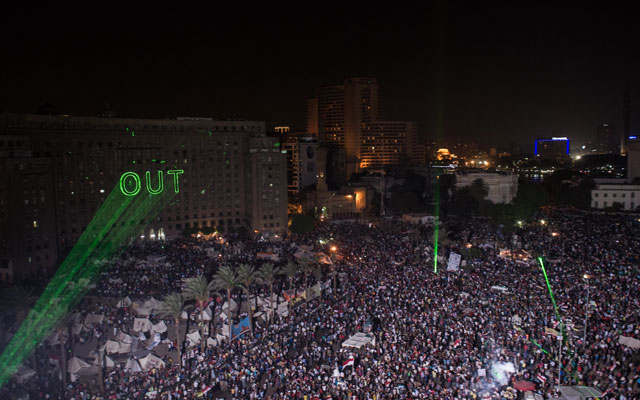Obama Administration Stumbles in Egypt’s Shifting Sands
James Phillips /
The Obama Administration’s influence in Egypt has evaporated as Egypt’s “Arab Spring” hopes for a democratic transition have wilted during a summer of rising violence. Egypt’s army, which ousted the unpopular, autocratic and anti-Western President Mohamed Morsi in a July 3 coup, turned a deaf ear to Washington’s call for political accommodation with Morsi’s Muslim Brotherhood movement, just as Morsi ignored calls for political power-sharing before the coup.
Egyptian officials maintain that they sought a political compromise with Morsi but were repeatedly rebuffed: “We bent over backwards to bring in the Brotherhood,” one told the Wall Street Journal. But Morsi, counting on the Obama Administration’s continued support, stubbornly refused to compromise on his demand to be reinstated as president. This was something that the military would never agree to after Egyptians staged the largest political demonstrations in human history on June 30, calling for Morsi’s resignation.
The Obama Administration unrealistically pinned its hopes on a political reconciliation based on wishful thinking. Morsi continued to act as if his narrow 2012 election victory entitled him to ram his Islamist agenda down Egyptian throats. And the army, backed by strong popular support, rejected any compromise that would restore Morsi or his Muslim Brotherhood cronies to power.
The Administration failed to appreciate the degree to which Egyptian politics is an extreme sport with lethal consequences in which compromise is often perceived as weakness. It should not have been surprised that Morsi, never a genuine democratic leader, acted increasingly like a dictator after assuming office. By failing to publicly criticize and penalize his power grabs, the Administration appeared to be an enthusiastic backer of the Muslim Brotherhood and lost its credibility with many Egyptians—particularly secular, Christian, and liberal democratic leaders who should have been natural allies of the United States.
In despair, many Egyptians publicly called for the army to intervene, which it did on July 3. Now Egypt has plunged into a violent political confrontation that has claimed more than 600 lives. The Muslim Brotherhood has called for massive demonstrations today as part of a “Friday of anger.” Its supporters continue to attack government buildings, police stations, and the churches, businesses, and homes of Egypt’s Coptic Christian minority.
Egypt’s interim government has authorized greater use of force in suppressing attacks on government buildings and personnel. The government asserted that 43 security personnel were killed in clashes with pro-Morsi demonstrators who fortified two squares in Cairo and exchanged gunfire with police before they were forcefully expelled on Wednesday. The violence is likely to escalate as long as the Muslim Brotherhood continues to call for the overthrow of the new government.
By provoking further violence, the Muslim Brotherhood hopes to stoke disaffection with the government and drive a wedge between it and its Western supporters. The army, for its part, is gambling that terrorist attacks by Morsi’s supporters and ultra-radical Islamist terrorist groups that have been proliferating in the Sinai will further alienate Egyptians and drain away the Brotherhood’s popular support.
The Obama Administration has tried to serve as a neutral mediator between its former protégés in the Muslim Brotherhood and the military-backed regime, but it is distrusted by both sides, who consider it to be a naïve and unreliable partner. President Obama tried to steer a neutral course in a statement yesterday in which he announced the cancellation of a military exercise with the Egyptian armed forces next month, but he rejected an immediate cutoff of U.S. aid to Egypt.
Such symbolic half-measures are unlikely to defuse the crisis or satisfy any of the factions inside Egypt (or Washington, for that matter). As columnist Jackson Diehl noted in today’s Washington Post: “Obama looks like a president in full flight from a world that looks nothing like what he imagined when he took office.”
The implosion of the Administration’s Egypt policy is a microcosm of its failed approach to the “Arab Spring” revolts that have destabilized many other Arab countries over the past two-and-a-half years. The net result has been a decline in American influence, prestige, and security. Meanwhile, Egypt is slipping deeper into political violence, chaos, and economic disaster.

